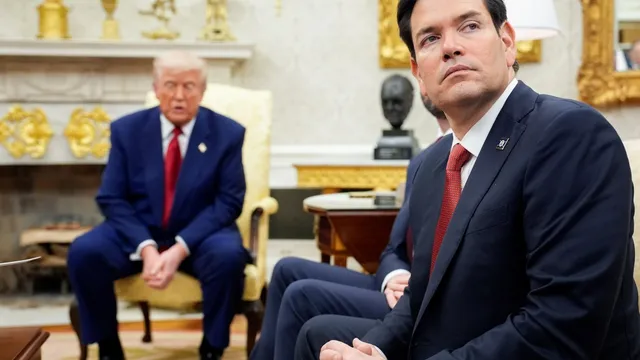
Marco Rubio juggles multiple key roles under Trump administration
2025-05-10 11:00- Marco Rubio has transitioned from presidential rival to a key figure in the Trump administration, obtaining a unanimous Senate confirmation as Secretary of State.
- He and Scott Bessent have gained influence amid competing factions, especially in economic and foreign policy discussions.
- Concerns arise over Rubio's ability to manage multiple high-profile roles effectively, particularly in the context of escalating national security challenges.
Express your sentiment!
Insights
In the United States, Marco Rubio's political ascendance under President Donald Trump has sparked discussions regarding his ability to effectively manage multiple vital positions. Having transitioned from being a presidential rival to serving as a pivotal figure within the Trump administration, Rubio has held roles that include Secretary of State and National Security Advisor. His confirmation for the Secretary of State position was unanimous, with a notable 99-0 Senate confirmation vote. However, he faces increasing scrutiny over whether one individual can successfully juggle the responsibilities demanded by these high-stakes roles, especially with national security threats proliferating globally. The backdrop of Rubio's rise involves the complexities within Trump's administration, characterized by rivalry among factions. As Trump grapples with various policy areas, hardliners have often clashed with establishment figures. Marco Rubio, along with Scott Bessent, appears to be gaining influence, especially in essential economic and foreign policy discussions, where they have pushed back against hardliner perspectives. This dynamic reflects an ongoing struggle in the administration, whereby competing interests vie for Trump's attention and favor. Marco Rubio's journey in the administration has not been without challenges. Initially met with skepticism, he managed to obtain White House approval for decisive actions, such as the termination of hardline officials within critical agencies. His role has become ever more significant as international issues arise, with ongoing tensions involving Ukraine and Russia, as well as other geopolitical challenges in Asia. Rubio's ability to navigate these turbulent waters is under constant evaluation, particularly regarding his strategic importance in foreign negotiations and the management of diplomatic relations. There is a palpable tension surrounding Rubio's multiple roles; experts caution that the demands of these positions could lead to detrimental oversights in addressing crucial national security matters. The historical precedent set by previous officials like Henry Kissinger, who held similar dual roles, speaks to the rarity and complexity of such an arrangement. Critics emphasize that having a national security advisor who is frequently absent could jeopardize the administration's responsiveness to urgent crises. Consequently, the unfolding political landscape raises questions about the long-term sustainability of such a concentration of power in a single individual's hands and the corresponding implications for U.S. policy direction.
Contexts
The roles of the Secretary of State and the National Security Advisor are pivotal in the United States' foreign policy and national security framework. Historically, the position of Secretary of State was established with the creation of the Department of State in 1789, with Thomas Jefferson serving as its first Secretary. The Secretary of State is primarily responsible for formulating and executing the country’s foreign policy, representing the U.S. to foreign governments, and managing diplomatic relationships. Over the years, this role has evolved significantly; notable Secretaries like Henry Kissinger and Madeleine Albright have expanded the influence of the position, addressing complex global challenges and fostering international alliances. The advent of globalization and the increasing interconnectedness of nations have further amplified the importance of the Secretary of State, necessitating a more proactive and strategic approach to diplomacy that encompasses not only bilateral relations but also multilateral engagement through organizations like the United Nations and NATO. In parallel, the role of the National Security Advisor (NSA) emerged later, with the establishment of the National Security Council (NSC) in 1947, following the restructuring of the government after World War II. The NSA acts as the principal advisor to the President on national security affairs, coordinating across various agencies and ensuring that the President is informed on critical issues. Unlike the Secretary of State, who is a Senate-confirmed position, the NSA is appointed directly by the President and serves at their discretion. This arrangement allows for a more fluid and adaptable response to security challenges, as the NSA can swiftly mobilize resources and information from multiple agencies. Throughout its history, the NSA has played a key role in addressing Cold War tensions, managing crises, and shaping defense policies, with figures such as Henry Kissinger and Condoleezza Rice significantly impacting how national security decisions are made. The interplay between the Secretary of State and the National Security Advisor is vital in crafting a cohesive and effective foreign policy agenda. While the Secretary of State typically focuses on diplomatic efforts and building relationships with other nations, the NSA often concentrates on emergency situations and security threats that could impact national interests. Balancing these two roles has proven crucial, especially in times of international conflict or during major geopolitical shifts, where rapid and coordinated responses are necessary. Historical episodes, such as the Cuban Missile Crisis and the Gulf War, exemplify how both positions must collaborate to navigate complex scenarios effectively, ensuring that the U.S. maintains its strategic interests while also pursuing diplomatic solutions. This synergy continues to evolve, adapting to the changing landscape of global security and foreign affairs. As the international environment becomes increasingly unpredictable with threats such as cyber warfare, terrorism, and economic competition, the roles of the Secretary of State and the National Security Advisor will remain indispensable. They must work in concert to not only advance American values abroad but also secure the homeland against emergent threats. The effectiveness of these positions will determine how well the United States can project its influence globally while safeguarding national security interests. Their historical trajectories reflect the broader evolution of U.S. foreign policy, emphasizing the crucial nature of these roles in addressing both immediate and long-term challenges on the global stage.